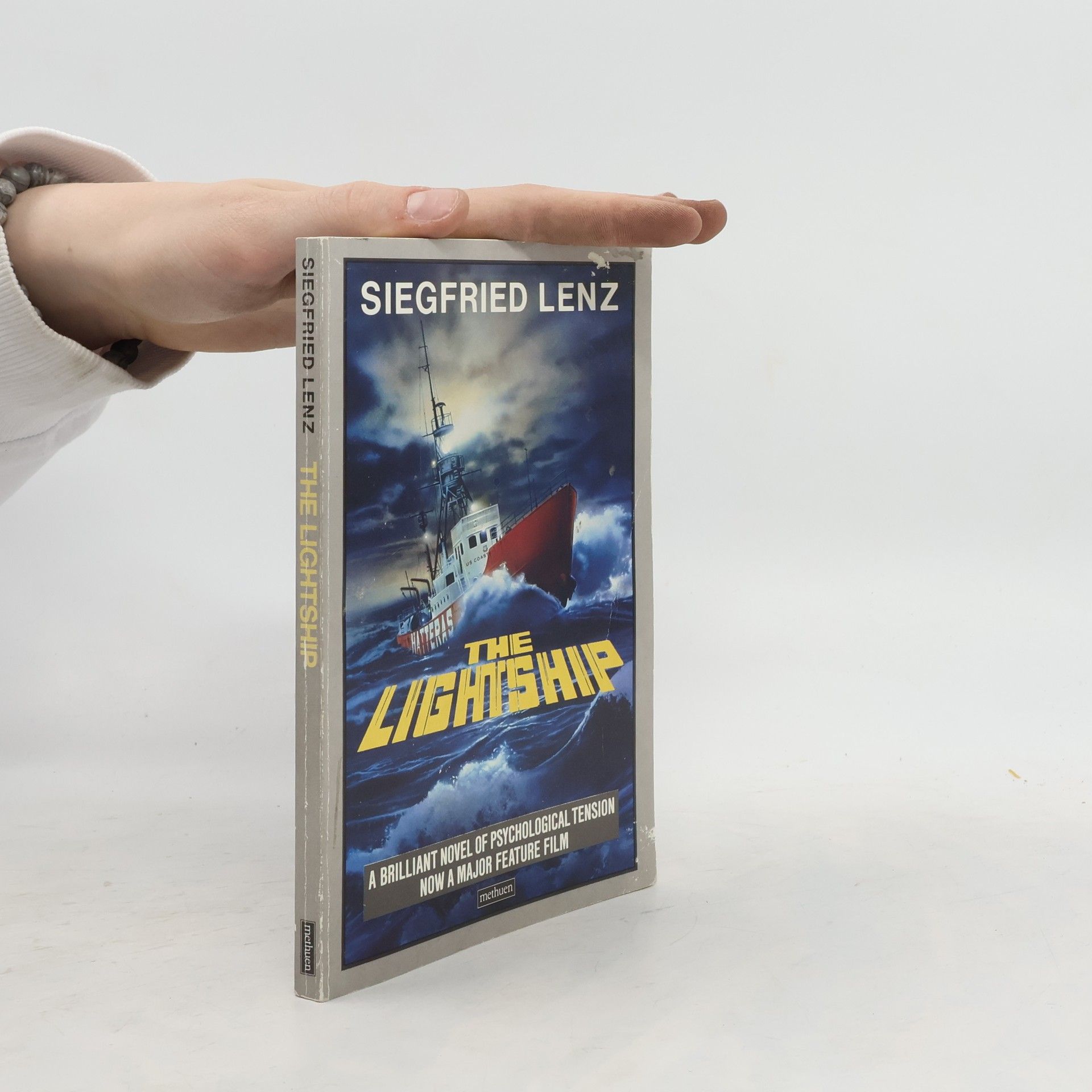Anlässlich des zehnten Todestags von Siegfried Lenz erscheinen in "Dringende Durchsage" unbekannte Erzählungen, die Einblicke in seine literarische Entwicklung geben. Die Texte zeigen Lenz als experimentellen und humorvollen jungen Schriftsteller zu Beginn seiner Karriere.
Siegfried Lenz Book order (chronological)
Siegfried Lenz's literary explorations delve into profound themes of guilt, responsibility, and societal adaptation. His prose is characterized by a realistic style and deep psychological insight into characters navigating complex moral dilemmas. Lenz meticulously examines the intricate relationships between the individual and the collective, emphasizing the critical importance of human solidarity and compassion. His writing offers a penetrating perspective that compels readers to reflect on their own place within the world.







In »Die Klangprobe« untersucht Steinmetz Bode die Stabilität von Steinmaterial durch Klangproben und wünscht sich, auch die Qualität seiner Mitmenschen prüfen zu können. Mit dem Selbstmord seines ältesten Sohnes, der Arbeitslosigkeit des zweiten Sohnes und der Unzufriedenheit seiner Tochter wird die Frage nach dem Wesen der Familie drängend.
Arnes Nachlaß
Hamburger Ausgabe Bd. 14
Hans soll die Sachen seines Pflegebruders Arne verpacken und erinnert sich an deren gemeinsame Zeit. Arne, ein Pflegekind nach dem Tod seiner Familie, kämpft um Akzeptanz in seiner neuen Familie. Trotz seiner Bewunderung für Wiebke bleibt er isoliert und riskiert schließlich alles, was zu einem Unfall führt, nach dem er verschwindet.
Die vier Novellen des meisterhaften Erzählers Siegfried Lenz in einem Band Krieg und Gewaltherrschaft; Verantwortung und Vertrauen; Gehorsam und Widerstand; die Macht der Machtlosen und die Freiheit der schöpferischen Phantasie; die Überwältigung durch die Liebe und die Erfahrung, »wie uns der Tod widerlegte«: Es sind die großen Themen seines Lebenswerks, die Siegfried Lenz in diesen vier Erzählungen verdichtet hat. Sie umspannen sein Schreiben von den Anfängen bis in die letzten Jahre. Jede dieser Geschichten handelt von einer »unerhörten Begebenheit«, wie Goethe sie von der Novelle verlangte. Verbrecher wollen ein Feuerschiff in ihre Gewalt bringen und werden überwältigt; Marinesoldaten widersetzen sich dem Befehl, einen sinnlosen Krieg fortzusetzen; die Romanze eines Schülers und seiner Lehrerin findet ein grausames und jähes Ende; Gefängnisinsassen erleben, als Schauspieler verkleidet, eine kurze Zeit der Freiheit.
Deutschstunde
In Einfacher Sprache
Siggi Jepsen ist in einer Anstalt für schwer erziehbare Jugendliche. Dort muss er eine Strafarbeit schreiben zum Thema „Die Freuden der Pflicht“. Sofort fällt ihm dazu sein Vater Ole Jepsen ein. Sein Vater ist Polizist in einem abgelegenen Ort im Norden Deutschlands. Mit seinem unbedingten Gehorsam unterstützt der Dorfpolizist das Naziregime. Ohne Rücksicht auf Familie, Freunde oder Nachbarn erfüllt er alle Befehle von oben. Nach und nach verliert er dadurch auch seinen Sohn. Mein Vater hat das Skizzenbuch des Malers verbrannt! Ich sehe ihn erschrocken an. Er sieht zufrieden aus, steht ruhig da und raucht. Er ist zufrieden, wie nach einem vollbrachten Auftrag. In diesem Moment fürchte ich mich zum ersten Mal vor meinem Vater. Siegfried Lenz erzählt in seinem fesselnden Roman „Deutschstunde“ auch ein Stück deutscher Geschichte. Dabei steht im Mittelpunkt, wie die einzelnen Menschen in ihrem Alltag politisches Unrecht unterstützten oder aber mit Widerstand bekämpften.
Florian, der Karpfen : ein Märchen und seine Geschichte
- 77 pages
- 3 hours of reading
Ein literarisches Juwel: ein bisher noch nie in Buchform erschienenes Märchen von Siegfried Lenz mit dem Titel Florian, der Karpfen steht im Zentrum dieses bibliophilen Bandes mit Texten über die besondere Beziehung des großen Erzählers zur Natur, zum Wasser, zum Angeln – und zum Fisch. »Als wir erfuhren, dass der Karpfen zum Fisch des Jahrhunderts gewählt würde, hielt es uns nicht mehr im Haus. Wir mussten schnell zu unserem Haus am Waldrand, um unseren beschuppten Freunden beizubringen, welche Ehre sie ereilt hatte. Das ist ja so gut wie der Nobelpreis, dachten wir.« Mit einem Nachwort von Maren Ermisch und zahlreichen Abbildungen
The Turncoat
- 304 pages
- 11 hours of reading
"Previously unpublished, this German postwar classic is one of the best books of this major writer, who died in 2014. The last summer before the end of World War II, Walter Proska is posted to a small unit tasked with ensuring the safety of a railway line deep in the forest on the border with Ukraine and Byelorussia. In this swampy region, a handful of men--stunned by the heat, attacked by mosquitoes, and abandoned by their own troops in the face of the resistance--must also submit to the increasingly absurd and inhuman orders of their superior. Time passes, and the soldiers isolate themselves, haunted by madness and the desire for death. An encounter with a young Polish partisan, Wanda, makes Proska further doubt the validity of his oath of allegiance, and he seeks to answer the questions that obsess him: When conscience and duty clash, which is more important? Is it possible to take any action without becoming guilty in some way? And where is Wanda, this woman from the resistance he can't forget? Written in 1951, The Turncoat is Siegfried Lenz's second novel. Rejected by his publisher, who thought that the story of a German soldier deciding to join the Red Army would be unwelcome in the context of the Cold War, the manuscript was forgotten for nearly seventy years before being rediscovered after the author's death. A posthumous triumph"-- Provided by publisher
Ein Stern strahlt in der Nacht
- 128 pages
- 5 hours of reading
Während die Stube warm und gemütlich ist, sind Wintertage oft vor allem eins: kalt und dunkel. Dieses liebevoll gestaltete Weihnachtslesebuch enthält über 50 ermutigende Erzählungen und Gedichte bekannter Autoren zum Fest. Gerade zur Weihnachtszeit gilt es, sich die Hoffnung und Freude in Erinnerung zu rufen, welche uns durch die Geburt Jesu zuteil geworden ist. Dieser Absicht folgen die wohltuenden Texte und Schriften. Ein schönes Geschenk für Advents- und Weihnachtsbesuche, ein besinnliches Lesebuch für ruhige Stunden sowie eine Fundgrube ansprechender Vortragsstücke für Weihnachtsfeiern. - ermutigende Geschichten für lange Wintertage - über 50 weihnachtliche Texte - viele beliebte Autoren
»Seit dem Märzmorgen, an dem ich durch das Eis des Lyck-See brach«, erinnert sich Siegfried Lenz, »hatte ich eine besondere Beziehung zum Wasser – eine Art dämmerndes Heimweh verbindet mich mit ihm.« So wie sich das Wasser thematisch durch sein Leben zieht, ist es auch in seinem literarischen Werk präsent. Lenz’ Romane und Erzählungen spielen auf dem Meer und an den Küsten, an Stränden, in Häfen und auf Schiffen, seine Figuren sind nicht selten Fischer, Angler, Hafenarbeiter oder Matrosen. Lenz’ schönste Texte über Flüsse, Meere und Seen versammelt dieser Band.
Königs Erläuterungen – Textanalyse und Interpretation mit ausführlicher Inhaltsangabe und Abituraufgaben In einem Band bieten dir die neuen Königs Erläuterungen alles, was du zur Vorbereitung auf Referat, Klausur, Abitur oder Matura benötigst. Das spart Zeit bei der Vorbereitung! Alle wichtigen Infos zur Interpretation... - von der ausführlichen Inhaltsangabe über Aufbau, Personenkonstellation, Stil und Sprache bis zu Interpretationsansätzen - plus 4 Abituraufgaben mit Musterlösungen und 2 weitere zum kostenlosen Download ... sowohl kurz als auch ausführlich ... - Die Schnellübersicht fasst alle wesentlichen Infos zu Werk und Autor und Analyse zusammen. - Die Kapitelzusammenfassungen zeigen dir das Wichtigste eines Kapitels im Überblick – ideal auch zum Wiederholen. - Das Stichwortregister ermöglicht dir schnelles Finden wichtiger Textstellen. ... und klar strukturiert ... - Ein zweifarbiges Layout hilft dir Wesentliches einfacher und schneller zu erfassen. - Die Randspalte mit Schlüsselbegriffen ermöglichen dir eine bessere Orientierung. - Klar strukturierte Schaubilder verdeutlichen dir wichtige Sachverhalte auf einen Blick. ... mit vielen zusätzlichen Infos zum kostenlosen Download.




